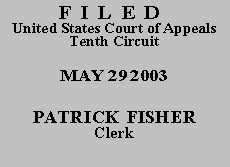

| RAY T. BLACKWELL,
Plaintiff - Appellant, v. SKO MANAGEMENT, INC., Defendant - Appellee. |
|
Plaintiff Ray T. Blackwell worked as a parts driver for defendant SKO Management, Inc., an operator of automotive sales and services dealerships. After the termination of his employment, he filed suit, claiming that SKO discharged him in retaliation for his complaints about discrimination, in violation of Title VII of the Civil Rights Act of 1964, as amended, 42 U.S.C. §§ 2000e to 2000e-17.(1) A magistrate judge conducted a bench trial, then entered judgment in favor of SKO.(2) Plaintiff, proceeding pro se, appeals. We exercise jurisdiction under 28 U.S.C. § 1291 and affirm.
Background
In reaching his findings and conclusions, the magistrate judge discounted Mr. Blackwell's credibility and credited SKO's version of events. The magistrate judge found that SKO fired Mr. Blackwell after incidents occurring over a week-long period. On Tuesday, February 1, 2000, he had a confrontation with a supervisor about his delivery workload and his refusal to work in the warehouse. For the next two days, Mr. Blackwell notified SKO that he was sick and did not report to work. On Friday, Mr. Blackwell did not either call in sick or show up for work. However, he came in to pick up his paycheck. His supervisor testified that this "was 'the straw [that] broke the camel's back.'" Mem. and Order at 7. He decided to fire Mr. Blackwell.
On Monday, February 7, Mr. Blackwell came to work and handed his supervisor a letter alleging that he had been the victim of race discrimination in the workplace. Some hours later, SKO discharged Mr. Blackwell, telling him that he was fired for Tuesday's insubordination and Friday's unexplained absence. The magistrate judge determined that SKO's actions were not motivated by Mr. Blackwell's complaint of discrimination and, therefore, SKO did not unlawfully retaliate against him.
Discussion
In this appeal, Mr. Blackwell challenges the credibility of defendants' trial witnesses and claims that the verdict was not supported by sufficient evidence. On appeal from a bench trial, we review the magistrate judge's "findings of fact for clear error." EEOC v. Wiltel, Inc., 81 F.3d 1508, 1513 (10th Cir. 1996). As our circuit rules make clear, such challenges require submission of the entire trial transcript for our review. See 10th Cir. R. 10.1(A)(1) ("The appellant must provide all portions of the transcript necessary to give the court of appeals a complete and accurate record of the proceedings related to the issues on appeal."); id., 10.1(A)(1)(a) ("When sufficiency of the evidence is raised, the entire trial transcript must be provided.").
Because Mr. Blackwell has submitted no transcript with the record on appeal, we are unable to consider his issues on appeal. Further, even if this court were to grant Mr. Blackwell's belated motion to supplement the record with portions of the trial transcript, the problem would not be remedied. An appellant's "failure to submit the entire trial transcript provides a . . . separate basis for rejecting [a] sufficiency of the evidence argument." Dilley v. SuperValu, Inc., 296 F.3d 958, 963 n.2 (10th Cir. 2002); see also Roberts v. Roadway Express, Inc., 149 F.3d 1098, 1104-05 (10th Cir. 1998) (rejecting sufficiency of the evidence claim where only appellant submitted only excerpts of trial transcript).
The judgment of the district court is AFFIRMED. Appellant's motion to supplement the record is DENIED.
Entered for the Court
Circuit Judge
*. This order and judgment is not binding precedent, except under the doctrines of law of the case, res judicata, and collateral estoppel. The court generally disfavors the citation of orders and judgments; nevertheless, an order and judgment may be cited under the terms and conditions of 10th Cir. R. 36.3.
1. In his Complaint, Mr. Blackwell also asserted that he was subjected to racial harassment and wage discrimination. Mr. Blackwell does not appeal the entry of summary judgment on those claims.
2. The parties consented to proceed before a magistrate judge, pursuant to 28 U.S.C. § 636(c).